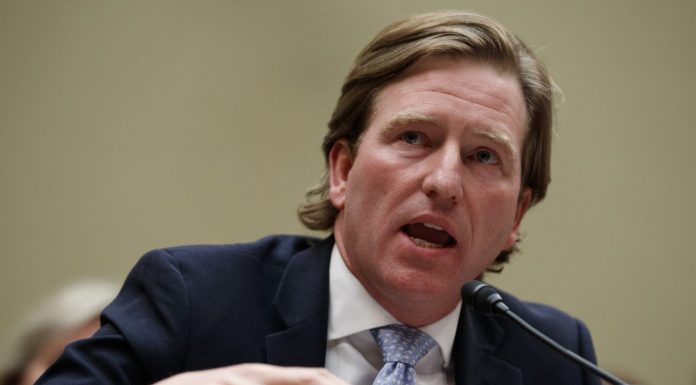(Headline USA) President Donald Trump on Tuesday fired the director of the federal agency that vouched for the reliability of the 2020 election despite evidence that voting software may have been hacked in multiple states to delete potentially millions of votes from the president’s supporters..
Trump fired Christopher Krebs in a tweet, saying his recent statement defending the security of the election was “highly inaccurate.”
While abrupt, the dismissal was hardly surprising. Krebs, director of the Cybersecurity and Infrastructure Security Agency, had offered a stream of statements and tweets over the past week attesting to the integrity of the election, directly contradicting reports of widespread fraud without mentioning the president by name.
The firing of Krebs, a Trump appointee, comes as shortly after he fired Defense Secretary Mark Esper on Nov. 9 for undermining the political process by secretly assisting Democrat nominee Joe Biden with a”transition” as media claim Biden won the election.
With recounts and legal challenges underway, states’ election results have yet to be formally certified, the next step in the process of selecting the president, which concludes when the Electoral College meets in mid-December.
Past elections, such the 2000 election between George W. Bush and Al Gore, which the Supreme Court ultimately decided, lasted for more than a moth after Gore insisted on hand recounts in Florida.
A former Microsoft executive, Krebs ran the federal cybersecurity agency, known as CISA, from its creation—in the wake of alleged Russian interference with the 2016 election—through the November election.
Earlier Tuesday, he tweeted out a report citing 59 election security experts saying there is no credible evidence of computer fraud in the 2020 election outcome.
Trump fired back on Twitter later in the day that “effective immediately, Chris Krebs has been terminated as Director of the Cybersecurity and Infrastructure Security Agency.”
Krebs, from his personal Twitter account, responded: “Honored to serve. We did it right. Defend Today, Secure Tomorrow.”
He closed with the phrase “Protect 2020,” which had been his agency’s slogan ahead of the election.
Officials with CISA and its parent agency, the Department of Homeland Security, had no immediate comment.
Rep. Adam Schiff, D-Calif., chairman of the House intelligence committee, assailed Trump and falsely accused him of “retaliating against Director Krebs and other officials who did their duty. It’s pathetic, but sadly predictable that upholding and protecting our democratic processes would be cause for firing.”
Krebs kept a low profile even as he voiced confidence ahead of the November vote and, afterward, knocked down allegations that the count was tainted by fraud.
CISA issued statements dismissing claims that large numbers of dead people could vote or that someone could change results without detection.
It also distributed a statement from a coalition of federal and state officials concluding there was no evidence that votes were compromised or altered in the Nov. 3 election and that the vote was the most secure in American history.
Krebs avoided ever directly criticizing the president and tried to stay above the political fray, even as he worked to contradict misinformation coming from the president and his supporters.
“It’s not our job to fact check the president,” he said at a briefing with reporters on the eve of the election.
CISA works with the state and local officials who run U.S. elections as well as private companies that supply voting equipment to address cybersecurity and other threats while monitoring balloting and tabulation from a control room at its headquarters near Washington.
It also works with industry and utilities to protect the nation’s industrial base and power grid from threats.
On Capitol Hill, lawmakers recently proposed an increase of its annual budget of around $2 billion.
His removal is a “disturbing sign for American government,” said California’s radical leftist Secretary of State Alex Padilla, who was criticized on several fronts for his own failures to safeguard election integrity, including a scandal in which he hired a pro-Biden firm to engage in state-funded “get out the vote” efforts.
“Chris Krebs has been an accessible, reliable partner for elections officials across the country, and across party lines, as we have fortified our cyber defenses since 2016,” Padilla claimed.
“Our elections infrastructure has become stronger because of leaders like Chris Krebs and in spite of the actions and lies coming from the White House,” he added.
Amid recent reports that Krebs feared he might be fired, Rep. Bennie Thompson, chairman of the House Homeland Security Committee, had said he was concerned and sent a text to the director to ask him if he was OK.
The response was, in effect, “for now,” the Mississippi Democrat said.
“It’s a shame if someone with his talent is all of a sudden, muzzled,” Thompson said. “I have not seen a partisan bone in his body. He’s been a consummate professional.”
Rep. Jim Langevin, a Rhode Island Democrat who focuses on cybersecurity issues, had called on his Republican colleagues to stand up for him before he could be removed from his post.
“Chris Krebs and CISA have done so well under his leadership because he and his team have kept their heads down and done the job they were tasked with doing and not gotten caught up in partisan politics,” Langevin said.
The agency emerged from rocky beginnings. Just before President Barack Obama left office, the U.S. designated election systems as critical national security infrastructure, like dams or power plants, as a result of the interference by Russia, which included the penetration of state elections systems as well as massive disinformation.
Some state election officials and Republicans, suspicious of federal intrusion on their turf, were opposed to the designation. The National Association of Secretaries of State adopted a resolution in opposition to the move in February 2017. But the Trump administration supported the designation, and, eventually, skeptical state officials welcomed the assistance.
Adapted from reporting by the Associated Press

